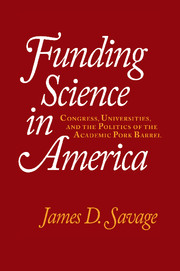Book contents
- Frontmatter
- Contents
- List of Tables and Illustrations
- Preface
- 1 The Politics of Academic Earmarking
- 2 The Incentives to Earmark
- 3 AAU and the Fight against Earmarking
- 4 The Struggle to Fund Academic Research Facilities
- 5 Lobbyists, Lobbying, and the Pursuit of Academic Earmarks
- 6 Congress and the Distribution of Academic Earmarks
- 7 Congress, the President, and the Fight against Earmarking
- 8 The Future of Academic Earmarking
- Select Bibliography
- Index
2 - The Incentives to Earmark
Published online by Cambridge University Press: 19 January 2010
- Frontmatter
- Contents
- List of Tables and Illustrations
- Preface
- 1 The Politics of Academic Earmarking
- 2 The Incentives to Earmark
- 3 AAU and the Fight against Earmarking
- 4 The Struggle to Fund Academic Research Facilities
- 5 Lobbyists, Lobbying, and the Pursuit of Academic Earmarks
- 6 Congress and the Distribution of Academic Earmarks
- 7 Congress, the President, and the Fight against Earmarking
- 8 The Future of Academic Earmarking
- Select Bibliography
- Index
Summary
Why do some colleges and universities seek academic earmarks?
What conditions and incentives lead an institution to violate the longstanding policy regime organized around the peer review system, which many educational leaders believe has contributed to the establishment of excellence in American academic science? The responses to these questions commonly revolve around the arguments that earmarking is justified because it serves as a remedy for the biases of peer review or that earmarking is a substitute for the federal government's failure to provide funding for academic research facilities. Yet, the incentives for a university to earmark are more varied and complex than simply the desire to rectify the flaws in the federal research grants allocation system. To understand the importance of these incentives in the institutional context of higher education, it is necessary to view the earmarking decision from the perspective of the university or college president, who, as the chief executive officer, possesses the authority to legitimize earmarking for that institution in ways that no other administrator or faculty member can.
The decision to seek an earmark is ultimately made by a president who is subject to a variety of incentives in making this often intensely personal choice. The contemporary university president faces the difficult goal of meeting rising institutional expectations with increasingly restrictive resources. Given these resource constraints, presidents may indeed be very receptive to obtaining a quick infusion of earmarked federal money at virtually no institutional or personal cost. Consequently, what is most surprising about academic earmarking is not that it exists, but that it does not occur more often.
- Type
- Chapter
- Information
- Funding Science in AmericaCongress, Universities, and the Politics of the Academic Pork Barrel, pp. 19 - 45Publisher: Cambridge University PressPrint publication year: 1999

